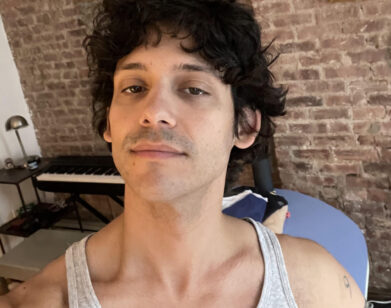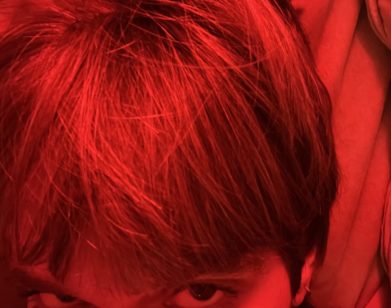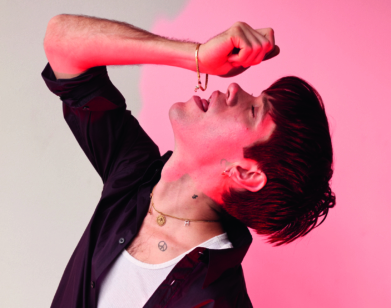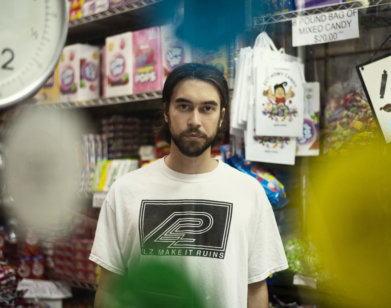Porches and Shamir talk about scamming the pop system
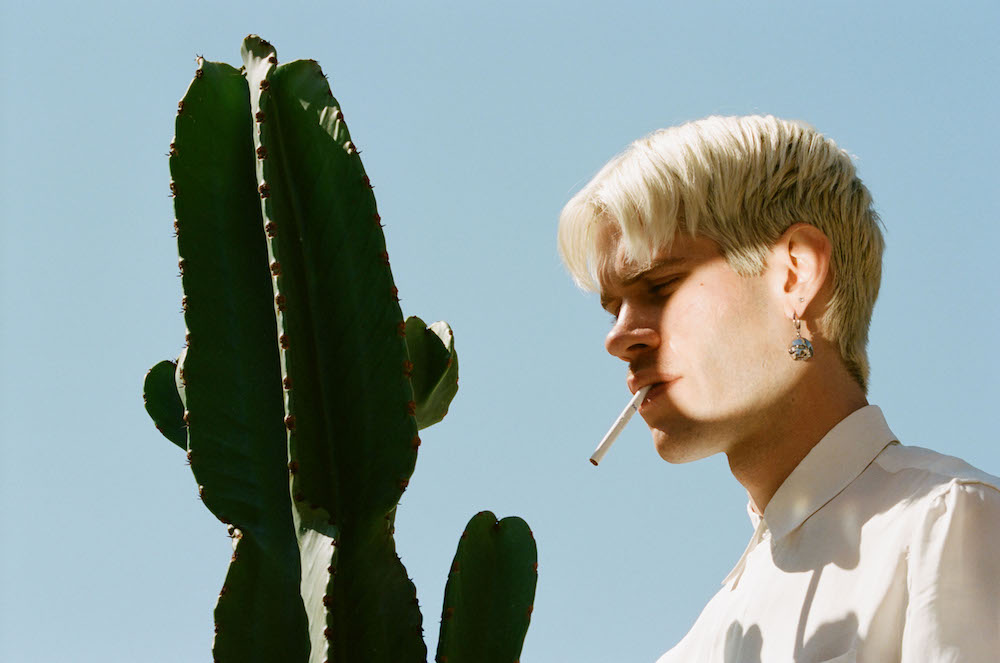
Every few years a new artist assumes the coveted title of New York’s unofficial dance-pop ambassador. For most of the 2000s, LCD Soundsystem held the crown, defining an era in downtown clubbing through frontman James Murphy’s cowbell-and-cynicism empire. But talk to any kid in artfully cut denim hanging around the right Chinatown brunch spots and you’ll realize that Porches is the rightful new dancefloor diplomat.
Ever since his breakout 2016 record Pool, the singer-songwriter and producer, born Aaron Maine, has delivered chic synth jams that exchange an earlier generation’s raucous snark for lovelorn sincerity with a moody blue streak. From dorm rooms to New York’s Bowery Ballroom, Maine’s music is on repeat everywhere that counts. That’s especially true since the January 19th release of his latest effort The House, released through the legendary Domino Records. The album has left a big impression on Maine’s friend Shamir, another exciting young pop act—over steak tartare and grilled salmon at Indochine, the pair talked about how they’ve found their own paths in a music industry that’s not always hospitable to outsiders.
On standouts like “Find Me,” Maine winds his delicate vocals around a propulsive groove, recalling the club-ready sentimentality of Hot Chip, Robyn, and Arthur Russell’s disco experiments. If his feverish fanbase is any indication, the lanky blonde musician who grew up playing in bands in Westchester County has captured the spirit of our time. In a city where it feels like everything’s either an advertisement or an argument, a touch of heart on a well-tailored sleeve goes a long way.
SHAMIR: Have you always self-recorded?
MAINE: I did Pool myself. I recorded drums and some stuff with a friend. But yeah, that was my debut as a producer. I did it at home. It was the first time I had signed a record deal and I felt like truly my purpose was to record. I didn’t have to have a job. I just wanted to not take it for granted. And obviously I enjoy working on stuff too. So I did it for that year.
SHAMIR: That’s cool.
MAINE: So that was that process and that went pretty fast, the fastest recording and writing I’ve done, probably. And then every step after that took probably three times as long for whatever reason. There were a lot of hang ups. Which is fine, maybe it happened for a reason. It was nice to not be scrambling to put stuff together. So after Pool I decided go off and do it myself and figure out how to make it sound as pro as possible.
SHAMIR: Oh yeah, that’s what I was gonna ask you. Because the drums, specifically—the vibe is similar as far as the patterns, but the sound is different. Did you get a new drum machine?
MAINE: Yeah, I got a new drum machine, downloaded some new samples. I had two real drum machines that I used or would start the beat with, and then there’s one called the R8, and then this fancy one by this company called Elektron. It’s a new drum machine thing that had some samples, so I kinda combined the two.
SHAMIR: They sound so good and vintage but still mixed very well. Very heavy sounding. The quality is still there. Because when you work with a lot of vintage sound machines the quality isn’t always there.
MAINE: Yeah, I tried really hard to just have it sound good and get these clean recordings.
SHAMIR: Yeah, it was almost like listening to old house vinyl records but, super hi-fi. Usually people wanna keep the old school sound. But I think one of its strengths is it’s some of the cleanest, but still vintage sounding drums I’ve heard.
MAINE: How have your shows been? You’ve been touring a bit, right?
SHAMIR: Yeah, yeah, I toured for the first time in almost two years last month.
MAINE: Does it feel good to be back on the road, on your terms?
SHAMIR: Yeah, it feels good to be back on my terms. My bass player, Christina, we’ve been playing together since we were 16. So this is a tour of homies. I’d never toured with close personal friends, and it was just everything I needed in life.
MAINE: That’s beautiful, that’s really nice. I really admire you stepping back and being like, “This is how I want to do it, and I’m gonna do it how I want to do it.” Not too many people do that.
SHAMIR: Yeah, because it’s scary! You have to be at a point where you don’t care, and that’s where I was. You have to get to a point where it’s like, if this ended, I don’t care. I’m just gonna take this huge leap thinking it’s gonna end. And the fact that it worked out in my favor was a blessing honestly.
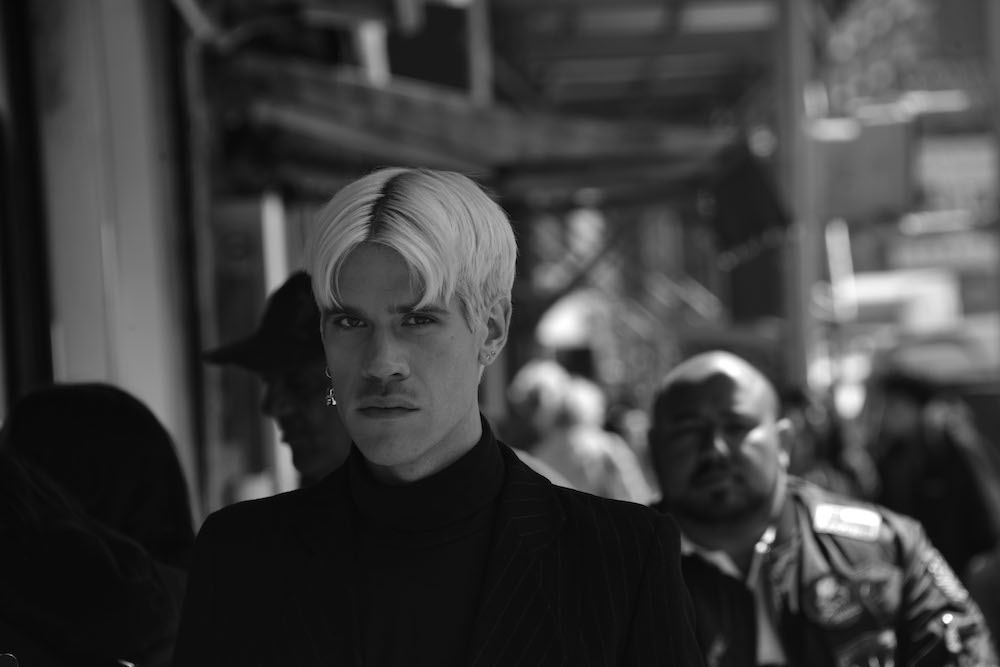
EZRA MARCUS: You guys are both, in one way or another, pop stars of some kind. What is pop music, what does being a pop artist mean to you?
SHAMIR: Modern pop music now is so formulated and specific. The cool thing about pop music back in the ’80s and ’90s is that it was really alternative. Everyone back then was looking for the next thing. When it comes to pop music now, everyone’s kind of looking for the comforting or familiar thing. I don’t think in the past 10 years I’ve seen someone on a huge pop level, like Katy Perry or Beyoncé, doing something groundbreaking. A lot of people would argue someone like Frank Ocean counts, but at the same time, he’s an independent artist.
MAINE: The spectrum has widened massively in the past two decades or something, where something that I release could be considered pop music. But it’s interesting having the accessibility to pop sounds on your fucking phone. I often find myself trying to make my songs sound like what’s on the radio, at least quality-wise. A lot of young people making music have access to create their own take on pop music, and so there’s all this weird shit. Also I was wondering how in the ’80s it was like, what is next? Supposedly these artists were transcending and pioneering. Perhaps they’ve always been stealing from the subcultures and the youth, but now that there’s the internet, everyone can see where Rihanna ripped off this song, and Kanye ripped off this song. You can’t really pull it off as your own. It’s all about your taste and less about actually being inventive or something.
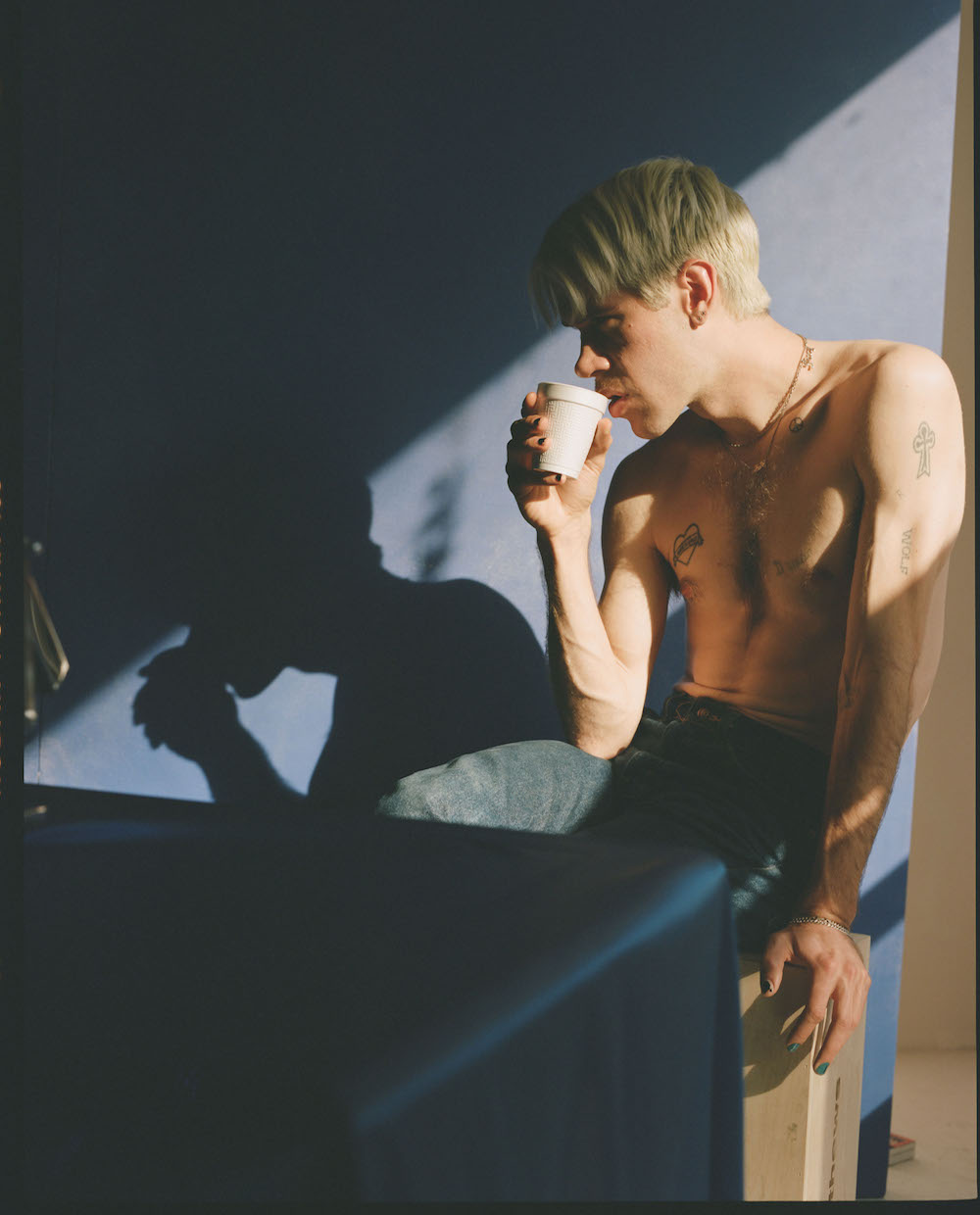
SHAMIR: I think pop music also is very affected by our capitalist society. I’ve seen first hand how it can be detrimental to the art, when I started to see copycats of “On the Regular” for commercials and shit. It’s wild to me that music is really seen as a commodity and not a piece of someone’s being, a piece of someone’s soul, a piece of someone’s heart. And I think that’s why I stopped caring about production quality. I was like, how about I make good songs that no one wants to repeat. How ‘bout that? The quality will be in the songs, but no one’s gonna wanna rip off a fucking four-track demo. No one’s gonna wanna rip off anything from Revelations to sell clothes or electronics. It’s also really frustrating for a lot of people who are confused by the switch and are like, “Shamir had this really great debut, why is he doing this?” And it’s because I had so much stolen from me. At this point, I’m just showing the world what I can do by myself. Lo and behold, it’s actually been working in my favor.
MAINE: What do you think about the 15-year-olds in Florida making the wildest music that the youth has ever made, and how that’s taken the world by storm?
SHAMIR: I know specifically what you’re talking about, and I think those artists specifically—this is just my opinion—those are weird kids who want to be popular. And I think they got lucky in the sense that they didn’t study pop music the way that I think me and you have, in a sense where we kind of felt like we had to assimilate. In the same sense where it’s like, older queers look at newer queers like me and think, “Oh, they didn’t have to come out, or they didn’t have it as hard, blah blah blah.” Which is fucking true and I acknowledge my privilege in that sense.
MAINE: It’s a lot of weird kids coming out with a lot of weird forward thinking music, but I think they all have the same capitalist goal in mind.
SHAMIR: One person that comes to my mind is [Cash Me Outside rapper] Danielle Bregoli, Bhad Bhabie. And I love Bhad Bhabie. I’m obsessed with her. I think she’s as real as she could possibly be. I think she’s 100 percent genuinely being herself. But she’s not putting art over money. She’s definitely trying to be out here in these streets.
MAINE: Right. Isn’t that the new pop thing? It’s like, scamming the system or something.
SHAMIR: Yeah, and I get it! Scam as much as possible. Please do. But it takes a certain type of person to do that, and I realized that I just wasn’t, and I’d much rather be poor and happy than sad and scamming. But that’s just me. I encourage scamming. It’s just hard for me because I’m mentally ill. I’m bipolar, and I have to be as balanced as I possibly can. And you know, unfortunately if you’re mentally ill, scamming can have adverse effects on you.
MARCUS: It takes a toll to present yourself as someone you’re not.
SHAMIR: Exactly. And that’s just how I feel about that.
MAINE: Yeah, I’m still kind of undecided. Part of me really believes and is excited that these kids can be making music—I see that it’s driven by wanting monetary success, but I guess they’re being kind of fucked too.
SHAMIR: They are. I feel like I kinda got tricked into it. I just went along with things for the sake of avoiding confrontation, and then when everything built up, it was like … okay. I was very aware that I wasn’t here for material things and success. But my manager, my label, my publicist, all automatically assumed that I was, even though I expressed it. I guess they thought that was the part of like, “Oh, I’m cool, I don’t care about success.” Because that’s a vibe! And it wasn’t until things hit the fucking fan that I was actually putting my foot down. I think when I started to put my money where my mouth is, then people started to pull out. And I still didn’t care. When everything fell apart, I think they were ready for me to be like, “Okay I’m ready to assimilate, I wanna do this.” And then when I didn’t do that it was kind of the last straw. It was scary, because I was ready for it to be the end. But art is powerful, you know? Art speaks louder than anything else.
PORCHES’ NEW ALBUM THE HOUSE (DOMINO RECORDS) IS AVAILABLE NOW.

